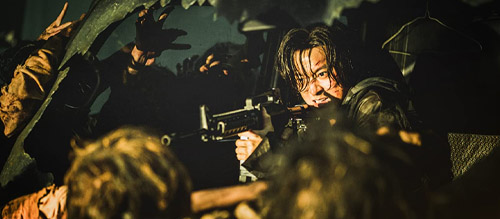Peninsula (2020) Review
Peninsula (2020)
Director: Yeon Sang-ho
Screenwriters: Yeon Sang-ho, Park Joo-Suk
Starring: Gang Dong-won, Lee Jung-hyun, Kim Min-jae, Koo Kyo-hwan, Kim Do-yoon, Kwon Hae-hyo, Lee Re, Lee Yi-won
There have been few films released in recent years that have been as shamelessly derivative as Train to Busan sequel Peninsula, especially outside of Hollywood. That said, American movies have been cribbing off East Asian cinema for decades, so perhaps it’s about time to redress the balance with this diverting, if uninspired zombie-action follow-up.
As established in a seriously clunky American news report, four years after a zombie outbreak in Seoul and later Busan, the entire Korean Peninsula has been quarantined by the rest of the world to contain the spread of the virus. Only heavily-armed marauders and the most resourceful small groups of survivors remain in cities, with the rest of the South Korean population either infected or refugees in neighbouring countries. Guilt ridden ex-soldier Jung-seok (Gang Dong-won) and his widowed brother-in-law Chul-min (Kim Do-yoon) accept a dangerous mission from Hong Kong gangsters to return an abandoned truck carrying millions of dollars from an overrun Busan, becoming trapped in the city in the process.
The unique take on zombies are still the main draw of spending more time in this post-apocalyptic world. The undead of the Busan-verse run like the 28 Days Later infected but with a jerky, unsettling, rictus-affected movement made chillingly convincing by the all-in physicality of the extras. These zombies are relentless but not too bright; they can be easily distracted by any bright light or noise and stand dormant in darkness like chickens in covered cages. This film sees its zombies on the one hand tearing people apart in a depraved man-made bloodsport arena and surging out of a shattered glass overpass in a corpse tidal wave, and on the other hand they are fooled by a light-up remote control car and flummoxed by open vehicle doors blocking their path.
Less unique a vision is how the film falls over itself to explicitly imitate other genre fare. Zombie outbreak may be one of the default apocalypse scenarios, but “the Mad Max bit”, “the Lost World bit” and “the Running Man bit” probably won’t stick in the minds of the average film fan.
The performances that were uniformly grounded and empathetic in Train to Busan are decidedly more mixed here. Gang Dong-won and Lee Jung-hyun are pretty strong and compelling leads, as are the resourceful smart-ass sisters played by Lee Re and Lee Yi-won, but the villains are another story. Kim Min-jae and Koo Kyo-hwan are beyond cartoony as Sergeant Hwang and Captain Seo, the leaders of a band of marauders who pass the time betting on how long imprisoned survivors will last in a confined area with zombies – their post-apocalypse teeth are almost as terrifying as their over-acting.
Director Yeon Sang-ho absolutely has an eye for entertaining action, but whether because of the film’s budget or for reasons of practicality, an unconvincing CG-sheen hangs over a lot of the film’s more elaborate and spectacular sequences. The best action scenes are those that come early in the film and are still somewhat grounded in what passes for reality. A desperate and ragtag group must sneak into Busan as night falls, snaking through a maze of abandoned vehicles, avoiding making noise to attract zombie attention until the inevitable car alarm is set off. Shortly thereafter one of our heroes is saved from certain death by the arrival of an armoured car driven by a thirteen year-old, who proceeds to flatten wave after wave of zombies with power slides. The car chase at the end of the film that serves as a grand finale goes on forever, and ever, and then some more, and looks like it was made about a decade ago with not enough money, with vehicles moving too fast to look natural and bouncing like rubber when they are totaled.
The reason Train to Busan worked like gangbusters was the clever use of a confined location. Peninsula wanted to go bigger and so expanded the film world too quickly, losing narrative focus, clear scene geography and tangible threats in the process. The bad guys’ motivations are nebulous and the survivors seem to shuffle uncertainly from scene to scene without any clear aims beyond not being eaten by the undead.
As with any 2020 release involving the outbreak of a deadly virus, Peninsula takes on an added and unintended meaning to audiences watching it now. The final film is entertaining in part, but is overlong, unevenly paced and struggling to find its own identity. If only we in the real world were battling a pandemic that could be run over by a car.
11/24


